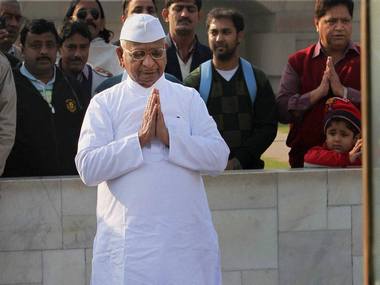The din over the Lokpal so far has involved everything but serious thinking about the fundamental premises behind the idea of an all-powerful corruption watchdog. All the noise over the bill till now has been about the broad contours of the institution and its powers - but not about specifics. This is where the entire confusion lies. Let’s get down to the basics to get a clearer picture. These are what the country needs right now. First, strong steps to check corruption, both bureaucratic and political. Second, the independence of the CBI, free from control of the government. [caption id=“attachment_154310” align=“alignleft” width=“380” caption=“There are too many anomalies and far too much alienation of people in the present arrangement. PTI”]  [/caption] Third, measures to make politicians accountable to people, and responsible. Fourth, efforts to make the judiciary efficient, fast and corruption-free. Fifth, corrective steps to make existing institutions work and be responsive to people. Sixth, to empower the common citizen to get services on demand. Seventh, a faster system to punish the guilty. Eighth, an efficient grievance redressal mechanism. There can be little disagreement on these since all, either in whole or partially, are essential conditions for a successful democracy. There are too many anomalies and far too much alienation of people in the present arrangement. It has started working against the very people from whom it derives the legitimacy to exist. The present system needs to change and improve. There can be no questions on that either. The core idea behind the Jan Lokpal Bill of Team Anna is pegged on the fundamental goals of a healthy democracy. Mobilising the masses to remind the political class of the power of the people goes perfectly well with that idea. There can be no faulting Team Anna on both the counts, or the way it has managed all forms of media to work to its advantage. However, while its diagnosis of the problem is correct, its prescription leaves a lot wanting. That’s the exact point where problems kick in. The entire debate from now on should not be reduced to a numbers game in Parliament, or be used as a platform for shrewd political moves; it should focus on taking up issues with the Lokpal idea that really matter. Team Anna has thrown up a serious question before the nation; it deserves better treatment than it is receiving now. Here are some of the doubts that need clarification. First, why the Lokpal and the Lokpal only? It makes little sense to concentrate all the responsibilities and power in one institution. It is always a better idea to disperse both among different institutions with clearly defined roles and accountability. All these should be free of political control. Imagine one Lokpal monitoring the politicians, the entire bureaucracy, the judiciary, the media and NGOs. The task would be unmanageable. Moreover, it would lead to the creation of a huge parallel bureaucracy. Smaller institutions are always smarter and more efficient. Second, governments must be allowed space to function. Everything about the government’s dealings cannot be as black and white as representatives of civil society would have us believe. If they want something like the Civil Nuclear Bill passed, they would need to make some compromises which won’t always look ethical but would be in the larger interest of the nation in the long run. If the Lokpal goes on finding fault and smelling corruption in every decision, governments, either in states or at the Centre, would cease to function. A hyperactive Lokpal can end up doing more damage to the country than good. Do we have a safeguard in the Lokpal Bill which ensures that the ombudsman stays within the limits? Third, why not make the CBI independent? If it is being misused by the government now, there’s every possibility that it could be misused by the Lokpal. The present arrangement where the Supreme Court monitors the CBI probe into serious crimes, can only be an interim option. The question is whether the Lokpal would guarantee its independence. Fourth, who controls the Lokpal institution if it goes rogue? A Mahalokpal? This is a serious question that needs to be looked into. Because all institutions start off with plenty of good intentions but gradually degenerate. The ideal solution would be not to vest too much power or responsibility with it. The more the power, the more the scope for its misuse. The country cannot create an institution in good faith, hoping that it would work. There must be checks and balances to keep it within defined boundaries. This aspect deserves a lot more attention. To come back to the original point, the whole dispute over the Lokpal is not one over intentions, but its implementation.
The core idea behind the Jan Lokpal Bill of Team Anna is pegged on the fundamental goals of a healthy democracy. But its solution is questionable.
Advertisement
End of Article


)
)
)
)
)
)
)
)
)



